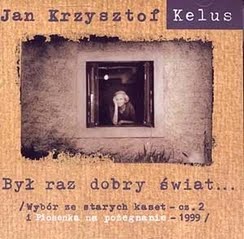Jan Krzysztof Kelus - Byl Raz Dobry Swiat (1999)
Jan Krzysztof Kelus - Był Raz Dobry Świat (1999)

1 Piosenka pasożyta społecznego (1968) 2 Był raz dobry świat... (1973) 3 Piosenka o wuju, historii i przypadku (1974) 4 Piosenka o drugiej Polsce (1976) 5 Zaduszki (1973) 6 Piosenka w tonacji g-moll (1976) 7 NN próbuje sobie przypomnieć słowa modlitwy (1977) - sł. Stanisław Barańczak 8 Piosenka znad sufitu (1977) - sł. Stanisław Barańczak 9 Piosenka zza lewej ściany (1977) - sł. Stanisław Barańczak 10 Hymn wieczorny (1977) - sł. Stanisław Barańczak 11 Z tamtej strony wysp 12 600 mil donikąd (1974) 13 Piosenka o dwóch rzeczach pozornie niezależnych (1977) 14 Ars Longa Vita Brevis (1980) 15 Koleda z New York City (1980) 16 Bajka o pszczołach (1981) 17 Elegia grudniowa (1981) 18 Nasze sny w stanie wojennym (1982) 19 Ostatnia szychta w KWK PIAST (1982) - sł. Jan Michał Zadula - Jaśko, ps. Jakub Broniec 20 Prywatne obowiązki (1982) - sł. Jan Michał Zadula - Jaśko, ps. Jakub Broniec 21 Polski Broadside (1982) 22 Jesień w pasiece (1982) 23 Piosenka o dwóch takich, co się szukali po drogach (1976) 24 Piosenka na pożegnanie (1999) 25 Piosenka na pożegnanie (1999) - nagranie z Jackiem Kleyffem 26 Piosenka na pożegnanie (1999)
Kompozytor Jan Krzysztof Kelus urodził 21 lutego 1942 w Warszawie. Studiował prawo, skończył socjologię na UW. Jego piosenki zalicza się do tych ‘drugiego obiegu’, czyli nagrywanych i publikowanych wbrew obowiązującej cenzurze, prosto ujmując - podziemnych. Do marca 1968 jak sam to określał - apolityczny aż do bólu. Teksty jego piosenek były odważne, groteskowe, zawierające patos i oczywiście ironie. Gnębiony przez SB, kilka razy aresztowany, usunięty z powodów politycznych z Akademii Medycznej, gdzie w latach 70 pracował jako socjolog. Obecnie mieszka wraz z żoną w okolicach Białowieży, gdzie ma własną pasiekę. 23 września 2006 został odznaczony przez Prezydenta RP Lecha Kaczyńskiego Krzyżem Oficerskim Orderu Odrodzenia Polski. ---last.fm
Jan Krzysztof Kelus, also known by his initials JKK, (born 1942) is a Polish singer, poet, composer, and a member of the democratic opposition in Poland between the 1960s and 1980s. A professional sociologist, Kelus is best known for a number of ballads which gained him a nickname of the Bard of the opposition and Polish Woody Guthrie.
After a brief period at the faculty of law, Kelus graduated from the faculty of sociology of the Warsaw University. After the events of March 1968 he became involved in various groups of the democratic opposition to the Communist regime of the People's Republic of Poland. Arrested in 1969 for his involvement in smuggling books published in Paris by Jerzy Giedroyc's Kultura through the Tatra Mountains, he was sentenced to imprisonment in the so-called Tatra Climbers' Trial. Released from the prison after the advent of Edward Gierek's rule, Kelus was involved in the Workers' Defence Committee (KOR) where he organized legal and financial aid to workers and labor activists persecuted by the communist authorities. About that time his songs, passed in bootleg copies outside of the official market and without acceptance of the censorship, became one of the symbols of the opposition. During that time he also translated several songs by Czech artist Karel Kryl.
Simultaneously to his anti-communist activities, in the 1970s Kelus was working at the Gynaecological Institute of the Medical University of Warsaw. Dismissed from the job due to his political activity in 1979, Kelus continued his involvement in the opposition. In early 1980s he was among the founders of the Niezależna Oficyna Wydawnicza CDN, the largest underground printing house of that time. Arrested in 1981 after the imposition of the Martial Law in Poland, Kelus was interned in Białołęka, along with other notable leaders of the Solidarity. During that time JKK's songs were performed by numerous artists, among them Jacek Kaczmarski and Antonina Krzysztoń. After the peaceful transition of power in Poland in 1989, Kelus withdrew from public life to a house near Białowieża, where he owns a small beekeeping farm. Most of his songs were officially issued after 1989 for the first time. --- bbc.co.uk
download: uploaded yandex 4shared mediafire solidfiles mega zalivalka filecloudio anonfiles oboom ziddu
Zmieniony (Niedziela, 27 Kwiecień 2014 20:20)
